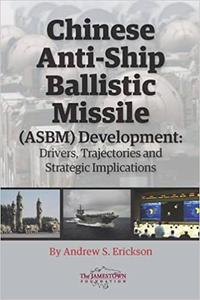
Andrew S. Erickson, "Chinese Anti-Ship Ballistic Missile "
English | ISBN: 0983084262 | 2013 | 110 pages | EPUB | 3 MB
In 2015, the largest military parade in Chinese history displayed nearly a dozen operational ballistic missiles, including sixteen trucks carrying the world's first anti-ship ballistic missile (ASBM), the Dong Feng-21D. Official commentary dubbed it "the assassin's mace for maritime asymmetric warfare." China's most advanced ASBM has a range of 1,500 km and a maneuverable warhead, giving the DF-21D the ability to hit ships far out into the Pacific.
Since 2010, China has deployed the world's first system capable of targeting a moving aircraft carrier group with long-range, land-based mobile launchers. How did Beijing get there first? This book tells the story for the first time. Drawing on a wide range of authoritative Chinese-language sources from doctrinal materials to technical papers, it traces in detail the motivations, genesis, programmatic history, and implications of Chinese ASBM development.
Chinese strategic thinkers have long sought to exploit their nation's continental depth to project power beyond its once-frequently-invaded shores, an approach termed "using the land to control the sea." Inspired in part by U.S. development of the Pershing II theater ballistic missile and China's own decades of investment in ballistic missiles, in the 1970s this strand of strategic thought began to converge in research toward an ASBM.
It would take a series of threatening events in the 1990s, however, to persuade Chinese leaders to fund concerted ASBM development as a dedicated megaproject. In May 1999, in the aftermath of the accidental NATO bombing of China's embassy in Belgrade, Chinese President Jiang Zemin directed the defense industry to rapidly develop "assassin's mace" weapons, declaring, "That which the enemy fears most, that is what we must develop."
For over fifteen years the U.S. military has been taking China's ASBM potential seriously and developing countermeasures. Despite rapid ongoing progress, China's reconnaissance-strike complex, the vast network of sensors and data processing necessary to attack a distant moving target, continues to exhibit significant limitations. However, the missiles themselves work and China has clearly fielded purpose-designed ASBMs of some potential capability. Their parade appearance suggests that Beijing considers them to be minimally operational and capable of achieving a measure of deterrence.
As peacetime conditions and weapons systems' growing complexity render the line between ongoing development and operational capability ever blurrier and more uncertain in actual employment, this book offers a study in using available information to understand the broad outlines of one of the world's great technological endeavors-and its meaning in China, and beyond. In addition to its compelling strategic history, it offers a model for conducting and evaluating Chinese-language open source research concerning Beijing's many military megaprojects to come.
Read more
Links are Interchangeable - No Password - Single Extraction



